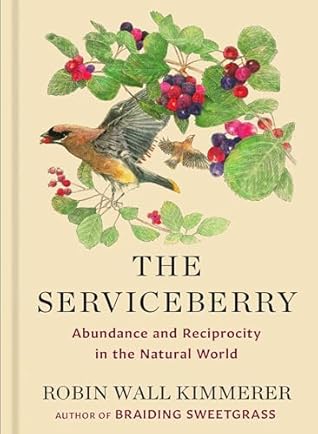More on this book
Community
Kindle Notes & Highlights
Read between
June 19 - June 21, 2025
Instead of changing the land to suit their convenience, they changed themselves. Eating with the seasons is a way of honoring abundance, by going to meet it when and where it arrives.
they come only this time of year—these ephemeral sips of summer, without the aftertaste of harm.
Food in our mouths is the thread that connects us in a relationship simultaneously spiritual and physical, as our bodies get fed and our spirits nourished by a sense of belonging, which is the most vital of foods.
Recognizing “enoughness” is a radical act in an economy that is always urging us to consume more.
Data tell the story that there are “enough” food calories on the planet for all 8 billion of us to be nourished.
crave could be met by sharing what we have. Ecopsychologists have shown that the practice of gratitude puts brakes on hyperconsumption. The relationships nurtured by gift thinking diminish our sense of scarcity and want.
If our first response to the receipt of gifts is gratitude, then our second is reciprocity: to give a gift in return.
Abundance is created by recycling, by reciprocity.
body. Energy cannot ever be completely recycled; it gets used up in the thermodynamic inefficiency of energy transfer among beings.
seems absurd to me that someone could own water, a free gift that falls like the proverbial manna from heaven.
We’ve surrendered our values to an economic system that actively harms what we love.
It pains me to know that an old-growth forest is “worth” far more as lumber than as the lungs of the Earth.
In a gift economy, wealth is understood as having enough to share, and the practice for dealing with abundance is to give it away. In fact, status is determined not by how much one accumulates, but by how much one gives away. The currency in a gift economy is relationship, which is expressed as gratitude, as interdependence and the ongoing cycles of reciprocity.
The prosperity of the community grows from the flow of relationships, not the accumulation of goods.
two economic worldviews, of prosperity gained through individual accumulation and prosperity gained through sharing of the commons, underpin the history of colonization in this country. The whole enterprise of dispossession and assimilation of the original peoples was designed to eradicate the notion of land as a source of belonging and to replace it with the idea that land is nothing more than a source of belongings.
active circles of freecycling, repair cafés, donated mugs in the coffee shop replacing disposables, clothing swaps, the Buy Nothing movement, and campus free stores, where dorm room necessities are passed among generations of students without a penny exchanged.
As an institution, the library comes close to being a gift economy in the realm of civic life.
The gift builds relationships, and that’s always a good thing. That’s what we really produce here—relationship, with each other and with the farm.” The currency of relationship can manifest itself as money down the road,
incremental change and creative disruption—are available to us as agents of cultural transformation.


